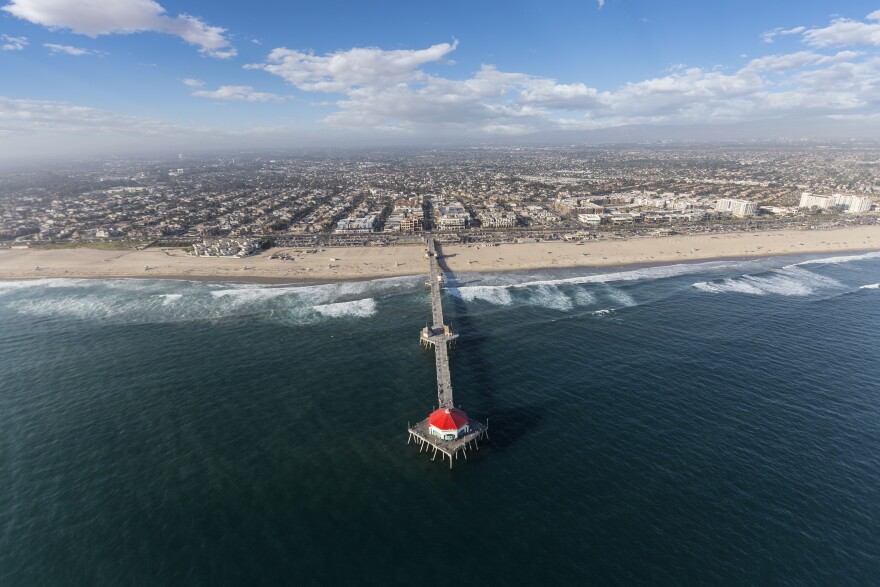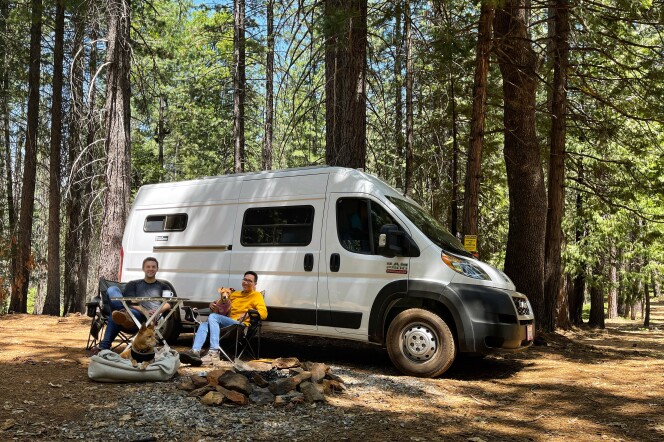This story is free to read because readers choose to support LAist. If you find value in independent local reporting, make a donation to power our newsroom today.
HB Mayor defends Voter ID measure as Gov. Newsom seeks to ban it

Gov. Gavin Newsom has signed a bill prohibiting local governments from requiring voter identification at polling places, a new law that is squarely aimed at Huntington Beach.
In response, Huntington Beach Mayor Gracey Van Der Mark told LAist that Newsom’s ban doesn’t apply to Huntington Beach, because it is a charter city, which means it has its own version of a constitution. “The state cannot pass any laws that strip us of our constitutional rights, so that law does not apply to us or affect our new election laws,” she wrote in a text message.
Here's the backstory
Huntington Beach voters approved a measure in March requiring people to show ID when casting a ballot. But now there's a state law on the books — SB 1174 by state Sen. Dave Min — that says cities can't enact or enforce voter ID requirements that go beyond state and federal law. Min, who is currently running for congress, said “an overwhelming body of evidence proves our elections are safe, secure, and above board.”
What's next?
This all means a legal showdown is likely between Huntington Beach and Sacramento. The two entities have repeated clashed over the city’s interpretation of what it can and cannot do as a charter city.
How voter IDs work in California
Voters in California have to prove their identity when they register to vote. But they do not have to show a government-issued ID when they actually cast a ballot.
Why is this an issue?
Critics of voter ID laws say there is ample evidence that the requirements disproportionately affect low income people and non-white voters. They also say the state and county already have robust measures in place to ensure voters are who they say they are. Supporters of the ID requirements, however, say such measures ensure that only registered voters are casting ballots and work to restore voters' trust in the election process.
How we got here
Huntington Beach voters passed Measure A — also known as Charter Amendment Measure No. 1 — in March. It asked voters if they wanted voters to show ID at the polls, and if they wanted the city to monitor ballot drop boxes and add more in-person polling locations. (The measure was seen as one of the first big tests of residents' feelings about the city's sharp turn to the right under the leadership of an ultra-conservative city council majority elected in 2022.) It passed with more than 53% of the vote. In response, the state filed a lawsuit to keep the measure from being implemented.
Why does this all seem familiar?
Huntington Beach regularly locks horns with the state on issues including housing, parental notification issues and even library books.
Go deeper on this topic
- What Gov. Newsom signed — and rejected
- Will Huntington Beach Residents Have To Show ID To Vote In Future Elections?
- Bill, which could shut down Huntington Beach’s voter ID requirements, passes California Assembly
CalMatters contributed to this report.
-
The decision means more than 100 tenants will get to stay in a West L.A. high rise. It could also have long-term affects on renters across California.
-
They are drilling bore holes to find the water that's likely making the Portuguese Bend landslide worse.
-
Grossman was traveling 81 mph when she struck and killed 11-year-old Mark Iskander and his 8-year-old brother Jacob in a marked crosswalk in 2020.
-
The peak of #VanLife may have ended just as COVID restrictions lifted, the movement's had a lasting impact.
-
Black mustard plants are invasive, ubiquitous and difficult to control.
-
Years ago, the critically endangered Devils Hole pupfish had a very close brush with extinction.
















